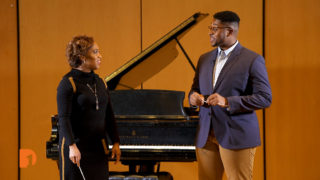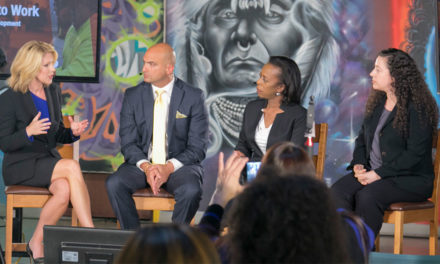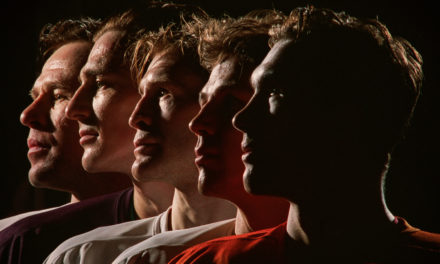For the first time since before the pandemic, the Detroit Symphony Orchestra’s “Classical Roots” concert celebrating the works of Black composers and musicians, is returning fully in person for the 2023 season.
The performances, which will be held March 3-4, are led by the DSO’s newly appointed Assistant Conductor and Community Ambassador Na’Zir McFadden. The annual concert was performed fully remotely in 2021 and performed in a hybrid format in 2022.
One Detroit contributor Cecelia Sharpe of 90.9 WRCJ FM met up with McFadden at Orchestra Hall for a conversation about the 2023 “Classical Roots” concert. Plus, Sharpe gets a lesson in conducting from McFadden.

Detroit Symphony Orchestra Assistant Conductor Na’Zir McFadden gives One Detroit contributor Cecelia Sharpe, left, of 90.9 WRCJ FM a lesson in conducting. | Photo by One Detroit
They talk about the role of the conductor in the orchestra, and McFadden gives a preview of what attendees can expect to hear at the concert and some of the special guest performances. Plus, McFadden shares the mission of the “Classical Roots” concert and the impact he hopes it will have on audiences.
Full Transcript:
Na’Zir McFadden, Assistant Conductor, Detroit Symphony Orchestra: Okay. Ms. C. Sharpe, welcome to your conducting lesson.
Cecelia Sharpe, Host, WRCJ 90.9 FM: All right.
Na’Zir McFadden: When we’re conducting, we should always be thinking of a plane, a big square. Never come out of this square. So, we’ll learn the first step, a proper igneous, and we’re going to bounce our baton. One, one, one, one, one, one. Now we’re going to learn a pattern of four. Most songs start in four. One, two, three, four. One, two, three, four. Perfect.
Cecelia Sharpe: I’m so glad that you are here in Detroit with us as the assistant conductor of the Detroit Symphony Orchestra. As an audience member, we see the conductor waving their hands. You’re waving.
Na’Zir McFadden: I love this. Waving your hands.
Cecelia Sharpe: Yes.
Na’Zir McFadden: Scooping the air.
Cecelia Sharpe: But what is the job of the conductor?
Na’Zir McFadden: Well, funny or not, the main job is to wave your hands and to scoop the air. But there is something deeper than that, than just scooping the air and moving within the wind. You’re in charge of the time, the tempo, the rhythm, the heartbeat of the orchestra. The musicians are some of the best musicians in the world. They know how to play their instruments incredibly well. They know the music. So, what can you give them other than just beating time?
Waving your– it’s not just about waving your hands, but also about how you shape the sound. How you shape the music. Play softer or louder, sharper accents or more legato. It’s so much deeper than just that, too. It’s about how you inspire the musicians to react to the music. They already know what’s happening next. How do you get them ready for it? How do you get the audience ready for that, so that they’re sitting on the edge of their seats? It’s about shaping the sound and creating an atmosphere, that’s with the role as the conductor is on the podium.
Cecelia Sharpe: So you’re preparing for this year’s upcoming ‘Classical Roots’ concert. Na’Zir, What’s on the program for this year’s concert?
Na’Zir McFadden: Well, we have a very exciting program. Of course, with every start of the classical Roots program, we start with “Lift Every Voice” played by the DSO and sung by the Brazeal Dennard Chorale. Next in the program, we have a piece that I’m really excited for because I get to collaborate with my former clarinet teacher and clarett idol. I love his playing Anthony McGill, who is the principal clarinetist of the New York Philharmonic and will be performing. Anthony Davis, “You Have The Right To Remain Silent”, which is a concerto for clarinet and orchestra that was written based off an encounter that Anthony Davis had with the police.
And it’s a really powerful piece for clarinet and orchestra. And in the piece, Anthony Davis writes that the clarinet improvises on top of the orchestra. So, I think the audiences will find this really exciting to hear with Anthony McGill comes up with on the Spot. We also have “Florence Price: Concert Overture #2”, which will be the first time the DSO performs this piece. We’ll also be collaborating with bass baritone Davone Tines, who is a wonderful singer.
And he’ll be singing a sermon, “Number One”, which is– he devised this work to incorporate three different musical pieces into one. And in between each movement, there will be a poem recited by Davone Tines, and “One” will have Detroit native and poet Jessica Care Moore joining us. And I’m so excited for this program. I think our audiences will truly be amazed with what we’ve come up with.
Cecelia Sharpe: That sounds like an incredible program this year, and we’re looking forward to seeing you conduct the Detroit Symphony Orchestra for this year’s ‘Classical Roots’ concert. What is the mission of Classical Roots and why is it so important to keep that mission of Classical Roots alive?
Na’Zir McFadden: Well, first, the mission of ‘Classical Roots’ is to uplift the voices of marginalized communities, but specifically the African-American community. We’re performing works by African-American composers. The reason why we continue to do this concert is to introduce this theme of African-American art and music to our communities. It’s very important that we continue the trend of diversity within our orchestras and our orchestra programming. It’s really important for young African-American musicians to see that they, too, can do it, that they too, belong on the orchestra stage.
Cecelia Sharpe: How do you hope that the performance impacts the audience with this year’s ‘Classical Roots’ concert?
Na’Zir McFadden: First, I should say this is the first ‘Classical Roots’ concert since the pandemic. So, I think it’s the perfect chance for our audience members to hear, for the first time in almost three years, what the orchestra sounds like playing music by African-American composers. I hope that our audience members will be able to see themselves in the music, to relate to the music more so than other composers. I pray that the audience members will enjoy the music as much as I do, as much as the musicians on stage do, and that they are willing to come back to Orchestra Hall to see the DSO or to see myself.
Stay Connected:
Subscribe to One Detroit’s YouTube Channel & Don’t miss One Detroit Mondays and Thursdays at 7:30 p.m. on Detroit Public TV, WTVS-Channel 56.
Catch the daily conversations on our website, Facebook, Twitter @DPTVOneDetroit, and Instagram @One.Detroit
View Past Episodes >
Watch One Detroit every Monday and Thursday at 7:30 p.m. ET on Detroit Public TV on Detroit Public TV, WTVS-Channel 56.




